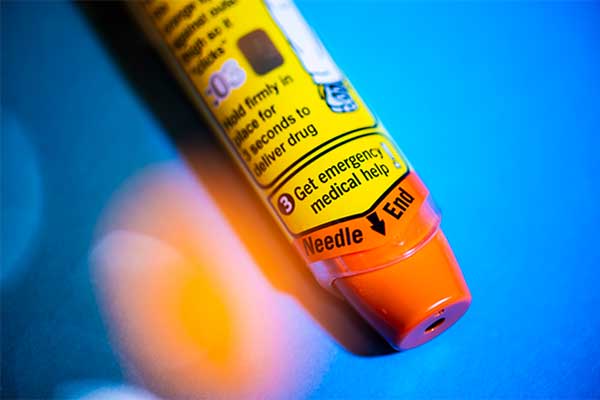Nasal Epinephrine Spray Alternative to EpiPen

Bouvé/ChE University Distinguished Professor Mansoor Amiji says a new epinephrine nasal spray recently approved by the FDA is a smaller and less costly device than the EpiPen and doesn’t involve an injection, which could appeal to many people.
This article originally appeared on Northeastern Global News. It was published by Erin Kayata. Main photo: Epipen was the only option for emergency treatment of allergic reactions, but the FDA just approved a new nasal spray that serves the same purpose. Photo by Alyssa Stone/Northeastern University
New neffy nasal spray alternative to the EpiPen could be ‘a gamechanger’ for people with allergies
Millions of Americans who have allergies have really had only one option when it comes to emergency treatment for a severe reaction: using an autoinjector like the EpiPen.
But now there’s an alternative. The U.S. Food and Drug Administration recently approved a new nasal spray that releases epinephrine, the medication used to stop reactions, into the nose instead of having it injected via needle.
The spray, sold under the brand name neffy, will address some of the main concerns people have with the EpiPen, which include the cost, the delivery method, and the size, Northeastern experts say.

Neil Maniar, director of the Master of Public Health program and a professor of the practice in the Bouvé College of Health Sciences, and Mansoor Amiji, Distinguished Professor and Chair of the Department of Pharmaceutical Sciences both agree a nasal spray for allergic reactions is easier and safer for consumers to use. Photos by Matthew Modoono/Northeastern University
“There’s a significant percentage of the population that has some form of allergy,” says Neil Maniar, director of the master of public health program and professor of the practice at Northeastern University. “Up until now, in terms of delivering a quick shot of epinephrine, the EpiPen was the only option. Over the last several years, the cost of the EpiPen spiked. It’s also an injection. … Some people have very strong feelings and fears around that. … (The nasal spray) is a game changer. It’s a really important step from a public health perspective to have that alternative that hopefully can be more readily available and used with greater ease.”
The cost of EpiPens skyrocketed around 2016 when Mylan acquired the product, says Gary Young, professor of public health and director of the Northeastern University Center for Health Policy and Healthcare Research. EpiPens used to cost about $100 per two-injector pack; they now cost about $600. Mylan authorized a generic product for half the cost, but the price still made the device inaccessible to many.
“There didn’t seem to be any justification other than the fact Mylan had acquired the product and felt that they could price it at that level and generate the margins that they wanted to generate,” Young says. “It seemed rather callous and they took a lot of criticism for it.”
Neffy is expected to cost $199 for two doses for people without insurance. Patients with commercial insurance can get two doses for $25. This pricing means Mylan has a reason to become more competitive with their products, Young says.
“It’s probably going to have a very big impact, because I think people are going to prefer the spray to the needle,” he adds. “I think it will also have a big impact on the pricing for the EpiPen. … Over time, this is going to represent a very important competitive threat to the pen and I expect to see the pricing going down.”
Read Full Story at Northeastern Global News